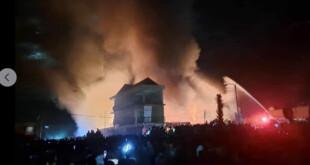The videos were made in collaboration with a diaspora political organization based in Australia.
The group, comprising producer Elias Kiflu, singers Seenaa, Gemechis Atbara and Oliyad Bekele and dancers Ifa Gemechu, Tamiru Keneni and Mobile Misganu, have been detained since December 2016 in Maekelawi Prison, which is notorious for torture practices.
According to the state owed media house Fana Broadcasting Corporation (FBC), Seenaa and her colleagues are also being charged for possessing inciting audiovisual materials that include clips of students and protesters who demonstrated between 2014 and 2016.
“The regime has intensified its war on Oromo artists,” said online activist Jawar Mohammed. “Almost all singers are either in jail, forced to flee or have gone underground. Music studios have been closed and their properties confiscated with Seena Solomon and Elias Kiflu being the latest victims.”
The contentious political environment in which the arrests occurred grew out of the Ethiopian government’s plan to expand Addis Ababa, the country’s capital.
In 2014, the ruling party announced plans to expand Addis Ababa into adjacent farm lands which belonged to the Oromo people. Oromo musicians then began to release songs, music videos, poems and interviews with government critics in solidarity with the opposition movement as well as siding with students who were already taking to the streets in protest.
This group of performers are not the first to face such repression. Ethiopian singers Hawi Tezera and Teferi Mekonen have also felt the fury of the law for releasing protest songs against the ruling party. Ironically the government’s actions seems to encouraged more singers to release more politically charged songs.





